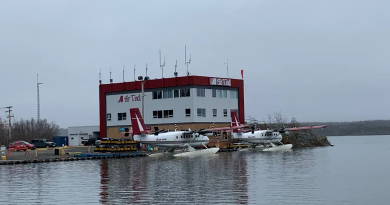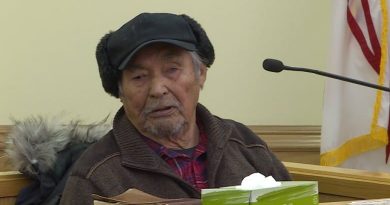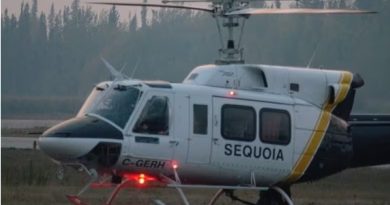5 projects vie for $1M Arctic Inspiration Prize

Five projects from across the North have been named finalists for a $1-million investment through the 2025 Arctic Inspiration Prize.
The finalists were announced in a news release Tuesday.
The Arctic Inspiration Prize awards millions of dollars each year to projects in education, health, culture, arts, language, science, traditional knowledge, climate change and the economy. Aside from the $1-million prize, it also awards up to four prizes of up to $500,000 each and up to seven youth prizes of up to $100,000 each.
In total, the prize will be awarding $3.7 million in funding this year.
In the $1-million category, there are two projects from Nunavut, one from the N.W.T., one from the Yukon and one that spans Nunavut, Nunavik and Nunatsiavut.
The Qajuqturvik Community Food Centre in Iqaluit is proposing a food sovereignty project that would employ Inuit hunters so the food centre could offer locally harvested country food.
In the Kivalliq, a project nominated by Nunavut Tunngavik Inc. would train people to collect environmental DNA — referring to the genetic material creatures leave when they move through an environment — in an effort to have more Indigenous experts monitoring the environment in the territory.
AsSearch-and-rescue project for Nunavut, Nunavik and Nunatsiavut is another that’s vying for the top prize. Called the Ujjiqsuiniq Search and Rescue Readiness Training Program, this would focus on reducing the amount of youth involved in search-and-rescue cases by offering them training.
A project from Yukon First Nations called Bibia Nàtsät Ku would open a house in Whitehorse where Yukon First Nations and midwives could offer sexual and reproductive health care, including birthing services. It would also offer training for Indigenous students.
The fifth project, Tłı̨chǫ Worlds, would be a virtual reality project for youth in Whatì, N.W.T., to learn language, traditions and land-based skills.
The winner will be announced on May 13.
Related stories from around the North:
Canada: Northern projects net $3.2 million funding boost from Arctic Inspiration Prize, CBC News
Finland: Everyone encouraged to boost Sami language visibility in Finland, Norway and Sweden this week, Eye on the Arctic
United States: Inuit leaders applaud UN move to designate International Decade of Indigenous Languages, Eye on the Arctic




Wishing all the finalists the best — these projects are shaping a stronger, more resilient North!
Hey everyone!
I just saw the announcement about the finalists for the 2025 Arctic Inspiration Prize, and I have to say, it’s really exciting to see such impactful projects coming from the North! The $1-million investment is a huge opportunity for these initiatives to make a difference in their communities.
I find the Qajuqturvik Community Food Centre project particularly inspiring. Focusing on food sovereignty and employing Inuit hunters to provide locally harvested food is such a meaningful way to promote traditional practices while addressing food security. It’s a great example of how local knowledge can be integrated into modern solutions.
The environmental DNA project from Nunavut Tunngavik Inc. is also fascinating. Training Indigenous experts to monitor the environment using genetic material is a smart approach that not only empowers the community but also enhances our understanding of local ecosystems. It’s crucial for sustainable environmental management, especially in such sensitive regions.
I’m also intrigued by the Ujjiqsuiniq Search and Rescue Readiness Training Program. Offering training to youth to reduce their involvement in search-and-rescue cases is a proactive step. It’s important to equip young people with the skills they need to stay safe while also fostering a sense of responsibility in their communities.
The Bibia Nàtsät Ku project from Yukon First Nations sounds like a game-changer for reproductive health care in the region. Having a dedicated space for midwives and health care services tailored to Indigenous needs is essential. Plus, the training for Indigenous students is a fantastic way to ensure that future health care providers are from the community itself.
Lastly, the Tłı̨chǫ Worlds virtual reality project is such a creative way to engage youth in learning about their language and traditions. Using technology to teach land-based skills can really resonate with younger generations and help preserve cultural heritage.
Overall, I’m really hopeful for these projects and can’t wait to see which ones get the funding. They all have the potential to create lasting positive change in their communities. What do you all think? Which project stands out to you the most?
Looking forward to hearing your thoughts!
These inspiring projects showcase incredible dedication to Indigenous culture, environment, and health across the North. Their innovation and community focus truly embody the spirit of the Arctic Inspiration Prize. Wishing all finalists great success in making a lasting positive impact!
This is encouraging to see, as the finalist projects reflect a wide range of community-driven priorities across the North, from food security and environmental monitoring to youth training, health care, and cultural preservation.